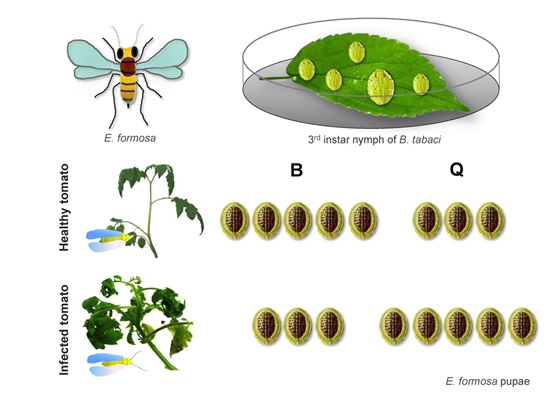分享到
Plant virus and its insect vector have combination effects on the parasitoid Encarsia formosa
Recently, researchers at the Institute of Vegetables and Flowers (IVF), Chinese Academy of Agricultural Sciences (CAAS) have made a periodical progress on the research of the interaction of plant virus, insect vector and the parasitoid. This research finding has been published online in Scientific Reports on August 6th, 2014.
In this study, the tritrophic interactions among a persistently transmitted plant virus, Tomato yellow leaf curl virus (TYLCV), its insect vector, the sweetpotato whitefly Bemisia tabaci, and a parasitoid, Encarsia formosa Gahan, one of the most extensively used biological control agents, were investigated. B. tabaci B and Q cryptic species are two emerging and most damaging invasive pests worldwide. The parasitism characteristics of E. formosa on B. tabaci changed with the virus status of the tomato plant. On healthy tomato plants, parasitoid-induced mortality was significantly higher in B. tabaci B than in Q. In contrast, similar mortality levels of B and Q were observed on TYLCV-infected plants. A higher rate of parasitism was consistently observed in B, independent of the TYLCV infection. Similarly, the life history traits of E. formosa were influenced by both TYLCV and the two cryptic species of B. tabaci. Specifically, E. formosa parasitizing B had a greater adult longevity and shorter developmental time on healthy plants, whereas the parasitoids developing from Q has a greater adult longevity on TYLCV-infected plants. The emergence rate of E. formosa was unaffected by either B. tabaci cryptic species or the virus. These results suggest that the vector-borne pathogen can manipulate the host suitability of a parasitoid and hence the parasitoid-host interactions. Also this result is encouraging for the biological practice for B. tabaci, since the parasitoids may also contribute to the suppression of TYLCV in the field.

More details are available on Scientific Reports on the links bellow:
http://www.nature.com/srep/2014/140806/srep05926/full/srep05926.html
By Wang Shaoli
wangshaoli@caas.cn
wangshaoli@caas.cn
Latest News
-
 Apr 18, 2024Opening Ceremony of the Training Workshop on Wheat Head Scab Resistance Breeding and Pest Control in Africa Held in CAAS
Apr 18, 2024Opening Ceremony of the Training Workshop on Wheat Head Scab Resistance Breeding and Pest Control in Africa Held in CAAS -
 Apr 03, 2024IPPCAAS Co-organized the Training Workshop on Management and Application of Biopesticides in Nepal
Apr 03, 2024IPPCAAS Co-organized the Training Workshop on Management and Application of Biopesticides in Nepal -
 Mar 28, 2024Delegation from the School of Agriculture and Food Science of University College Dublin, Ireland Visit to IAS, CAAS
Mar 28, 2024Delegation from the School of Agriculture and Food Science of University College Dublin, Ireland Visit to IAS, CAAS -
 Mar 25, 2024Director of World Food Prize Foundation visited GSCAAS
Mar 25, 2024Director of World Food Prize Foundation visited GSCAAS -
 Mar 20, 2024Institute of Crop Sciences (ICS) and Syngenta Group Global Seeds Advance Collaborative Research in the Seed Industry
Mar 20, 2024Institute of Crop Sciences (ICS) and Syngenta Group Global Seeds Advance Collaborative Research in the Seed Industry
